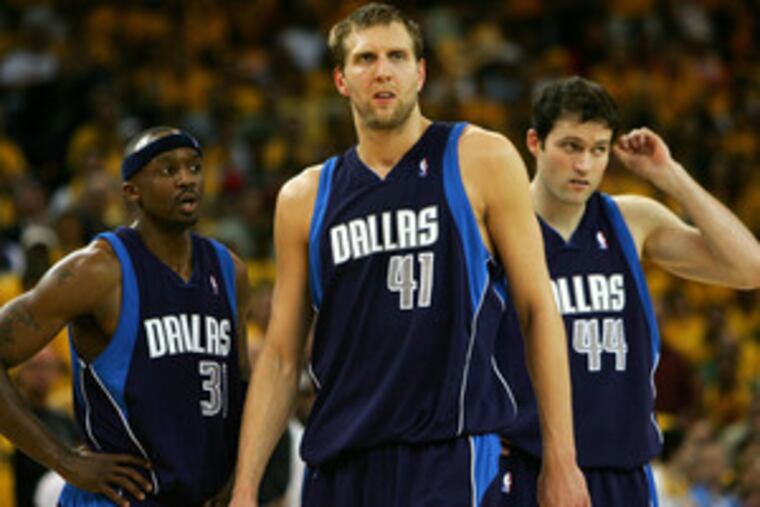David Aldridge | Early wipeouts leave NBA playoffs wide open
It is the fate of the Dallas Mavericks to now be a verb, a cautionary tale against being unprepared for the NBA's second season.

It is the fate of the Dallas Mavericks to now be a verb, a cautionary tale against being unprepared for the NBA's second season.
To Maverick is to spend too much time grinding out every game in the regular season, to play at maximum intensity and focus in January and February, but not have anything left in the tank when the playoffs begin - and then, be incapable of adjusting to the postseason's intensity.
"The first round is always a tough round, 'cause you don't want to be like Dallas," Detroit coach Flip Saunders said the other day. "You don't want to lose. Especially the top seed. They play not to lose instead of playing to win."
That pressure caved in on the Mavericks with every succeeding minute against Golden State, a cast of ragamuffins assembled by general manager Chris Mullin to play the way that Don Nelson always wants his teams to play - carefree, open, small. There may be some truth to Mark Cuban's accusation that Nellie is really more interested in the journey than the destination, that he's better drafting off of the side than being the lead dog. But it's also crystal clear that Nellie was in the Mavericks' heads, and was a step ahead of Dallas coach Avery Johnson from the jump.
And so the first round of the NBA playoffs ended with the league's best team flat on its back, out in six games, and the defending champion Miami Heat out on their feet, swept by the Chicago Bulls, making the rest of the postseason a wide-open affair.
You are involved.
While the league was fortunate to get most of its star players into the playoffs - save Kevin Garnett and Gilbert Arenas, whose knee injury toward the end of the regular season wrecked the Wizards' chances - the first round claimed a huge chunk of the NBA's brightest planets: Kobe Bryant, Tracy McGrady, Yao Ming, Allen Iverson, Carmelo Anthony, Dirk Nowitzki, Dwyane Wade and Shaquille O'Neal.
Will the country (I'm looking at you, Dubuque, Iowa) embrace Stephen Jackson in May?
More to the point, will viewers tune in to watch good teams such as Detroit, New Jersey and San Antonio, teams that win but don't look exciting doing it? The last few years suggest no - and suggest a virulent hypocrisy on the part of the sports public, which purports to want unselfish, fundamentally sound, non-chest-thumping play, yet turns away from such squads in droves when they're playing for championships.
No one at Olympic Tower would ever admit it, but having LeBron James and the Cavaliers, and Steve Nash and his fastbreaking Suns in the conference finals, at least, is an imperative.
The first round also apparently swallowed a coach whole, with the New York Post reporting yesterday that Jeff Van Gundy has decided not to return for 2007-08. The Rockets lost Game 7 at home to Utah on Saturday night, which led to McGrady - who'd said "it's on me" to get his team out of the first round for the first time in his career - being near tears and unable to complete his postgame news conference.
If Van Gundy has decided to quit - and he's given conflicting information to various people within the Rockets organization - the Houston job would be the most enticing of all the current coaching openings. (No, the Rockets have not contacted Larry Brown. Yet. But Houston had Brown on its very short list before signing Van Gundy to a four-year, $20 million deal in 2003.)
Meanwhile, the league was dealing with the latest assault on the competence of its officials, in the form of a study asserting unconscious racial bias on the part of its referees after a Penn professor and a doctoral candidate at Cornell examined box scores over a 13-year period. The study, whose findings were trumpeted on the front page of the New York Times last week, claimed that black players were subject to more foul calls, scored fewer points and committed more turnovers when officiating crews were all-white than when the crews were mixed-race or all-black.
It was a provocative thesis, one I might be more interested in examining if two of the three "independent experts" cited by the Times as giving credence to the findings didn't have connections to the paper and its authors.
One of the "independent experts" was the chair of the Wharton professor's doctoral thesis committee. A second helped create a statistical measuring element cited in the report itself. And both were among those who gave the authors "helpful comments" during the research and writing of the paper.
Another was Cuban, who now has a lot of time to read the thing.